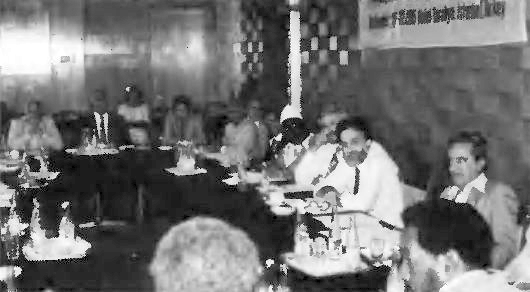![]()
The Words of the Kaufmann Family
|
|
The Words of the Kaufmann Family |

Visit
of the Golden Temple in Chaing Mai, Thailand.
At the conclusion of the fourth conference on "God, the Contemporary Discussion' held in August 1984 in Seoul, Korea, Father declared the founding of a totally unique organization. The success of the four successive conferences on God, sponsored by the International Religious Foundation (IRF), had brought together a vast net- work of leaders and scholars of every major religion. There could be no question in the minds of the participants that the Unification movement had become one of the most significant forces on the world religions scene. Hundreds of spiritually committed men and women had been touched by Father's vision, and they needed a way to continue to share and contribute to his vision. Father provided that way by proclaiming the founding of the Council for the World's Religions (CWR).
By October 1984 John Maniatis, then director of IRF, had assembled advisors for this council from each major world religion. These men and women were not chosen simply because they were renowned scholars of religion, but because they were personally committed to spiritual life within their respective traditions. CWR has been privileged to be guided by men and women of this kind of faith.
What was Father's purpose for creating this council? It was created to solve the problem of the hatred and conflict that exists between believers of different traditions, as well as among believers within religions. Those of us from Christian backgrounds know that Christianity is divided into hundreds of denominations. But this is not unique to Christianity. Sects and denominations divide all major religions: Hinduism, Islam, Judaism, Buddhism, and so on. These divisions both within and between traditions are painful to God and to the True Parents. The purpose of the Council for the World's Religions is to heal these divisions and bring believers into a harmonious relationship with one another. Religious wars are a disgrace to the cause of God. They are the source of tremendous human suffering, and they open up the religious community to frontal attacks on God and religious beliefs from the secular world.
The combined thrust of both inter and intrareligious concerns is unique to Father's vision; in no other organization in the world can one find the application of this insight. Father recognizes that intrareligious discord seriously hinders our desire for global religious harmony. Religions can never be expected to unite with one another if they remain incapable of bringing their own believers into accord. Father, aware of the urgent need for the religions of the world to heal their internal divisions, called for the council and its advisors to address this problem on a worldwide level.
The CWR advisors took the cause of religious harmony to heart, and responded to Father's desire, setting in motion the task of convening conferences in their respective traditions. Within months of Father's commission, five conferences promoting intrareligious harmony took place.
In early August 1985, Buddhists from Thailand, Sri Lanka, India, and Korea met in Chiang Mai, Thailand. The main division within Buddhism is between the Theravadin and the Mahayanan communities; beyond this, however, there are perhaps hundreds of further strains. Pure Land, Zen, and the many historical revivalist traditions (e.g., Nichi Ren Shyo Shyu) further separate Buddhists. The scholars in Chiang Mai examined the theological and historical roots of these traditions in search of paths of reconciliation.
The conference on Hinduism was held next, in Tune, India. The title of the conference was "Vedanta: Its Unity and Variety'.' In this title we can grasp an important dimension of all these intrareligious conferences: Variety is positively held. The pursuit of religious harmony is not the pursuit of religious uniformity.
In Switzerland, European and American Jews met at a conference called, "Unity and Plurality in Judaism Today' Here, the Orthodox, Conservative, and Reform factions within Judaism came together in search of their oneness.
Bad Nauheim, West Germany, was the site of the conference on Christianity, called "The Future of Ecumenical Cooperation"; and the Muslims met in Istanbul, Turkey, for a conference on "Promoting Understanding and Unity in Islam Today'
The exchange, the investment, and the excitement among the participants of all these conferences was moving to see.

Participants
at the conference on Islam.
Each religion has its own unique spirit and wisdom and its own special problems. Would it be exaggeration to describe it as a miracle if someone caused a Buddhist monk from Thailand, a Muslim imam from Gambia, a Hindu mystic from Vrindaban, a Jew from Washington DC, and a Christian Marxist from Germany to unite in a common religious experience? Yet it happened. Every single participant from Thailand to Istanbul was humble before the Divine and offered his or her very best in a living prayer for religious harmony. All were one in enthusiasm, spirit, and hope for the achievement of this great ideal. Not one of the approximately 200 participants failed to express sincere gratitude that Father, through the founding of CWR, had provided them with the opportunity to work toward healing the tragic divisions that scar the religions they love so deeply.
One source of amazement was voiced across all traditions: Why would Rev. Moon invest so much in religions other than his own? Why in the world would a Korean from a Christian tradition sponsor a conference in Pune for the unity of Hinduism? Rev. C. H. Kwak gave an address at each conference, in which he shared the history of Father's life and Father's vision for the future of the council. Through his words and spirit, participants could gradually begin to understand this historically unprecedented work. In addition to many exciting concrete plans and activities ahead for CWR, Rev. Kwak gave the following explanation to the participants of the five conferences on four continents:
"It is Rev. Moon's ideal that these activities bring a way to diminish fighting between religions.... Through dialogue, these ideals which make us one humanity can be articulated and acted upon. Religious communities can work in coordination to fulfill their social responsibility, counteract exploitation of religion by non-religious interests, and overcome the accusation that religious institutions are tools of social oppression. Only by all religions working together can these goals, which are vital to the future of the world, be accomplished!"
The Council for the World's Religions continues in pursuit of this noble end with an expanded program of conferences and publications for 1986.